Social Impact Assessments and Progress Reports
Healthcare Innovation Hub Development Project in Africa
As of July 16th, 2025
| Grant amount |
¥66,995,000 |
|---|---|
| Recipient |
CA Medlynks Kenya Limited (“CA Medlynks,” Head Office: Nairobi, Republic of Kenya) |
| Issue Finder |
Yoichi Shimada, CEO, CA Medlynks |
| Social issue targeted |
Lack of research/diagnostic infrastructure for widespread infectious diseases and other endemic diseases in Africa |
| Press release |
Social issue: There is no diagnostic infrastructure in Africa!
Many infectious diseases, including HIV/AIDS, tuberculosis, and Malaria, persist as deep-rooted problems in Africa. There has also been a rapid increase in non-infectious threats, such as cancer and lifestyle diseases. Both public institutions and private sector researchers and research organizations would normally play key roles in research and diagnostic activities targeting these diseases. However, there is a lack of facilities and equipment needed for this work, and support is needed to promote these activities.
CA Medlynks is a subsidiary of the healthcare startup Connect Afya K.K. (Head Office: Tatsuno City, Hyogo Prefecture; Representative Director and President: Yoichi Shimada). It provides testing infrastructure and diagnostic services in Africa. In addition, in collaboration with healthcare institutions, researchers, and research organizations, CA Medlynks creates an ecosystem to overcome the issues outlined above and works to advance disease research and diagnostic services. Through the Mitsui & Co. Co-creation Fund, Mitsui & Co. applies its vast business experience and networks in Africa to support the development of an innovation hub that will facilitate coordination with researchers and provide local stakeholders with access to the latest resources and diagnostic equipment.
Social Impact Assessments (Logic Model and KPIs)
Dialogue with issue finder and co-creator
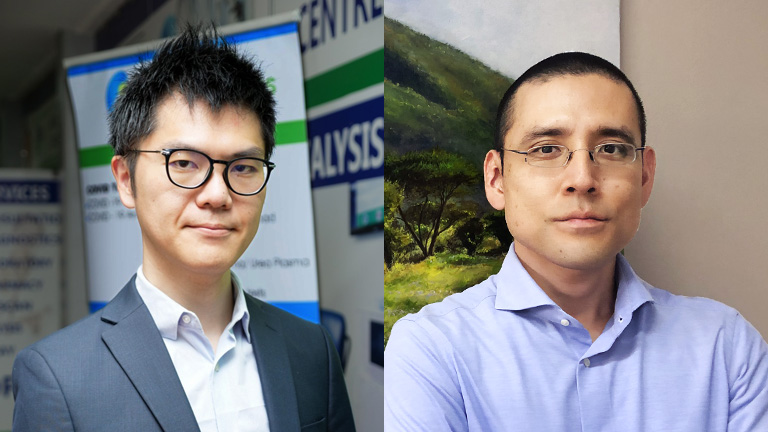
Interviewer: Kazumasa Miyamoto (Mitsui & Co.)
Interviewee: Yoichi Shimada (Connect Afya)
Miyamoto: Mr. Shimada, would you begin by telling us what motivated you to establish Connect Afya?
Shimada: After graduating from university, I worked for a consulting firm that helped pharmaceutical companies and medical device manufacturers to develop sales strategies. In addition to that role, I also helped acquaintances to establish startups in African countries such as Uganda and Kenya. Through those activities, my desire to play a direct role in solving frontline issues that I had seen in Africa has grown stronger.
I subsequently moved to France to undertake further study, which included a research trip to Kenya. While in Kenya, I observed firsthand that the local healthcare systems were considerably different from what I had seen in Japan, and that inspired me to do whatever I could to improve the healthcare environment over there. I was especially shocked by the reality that illnesses were often overlooked because patients were not being diagnosed properly. I decided to establish Connect Afya with the aim of creating a full healthcare flow by first making diagnostic services more widely available.
Miyamoto: So your experience in Kenya was a defining one. Living in Japan, it’s hard to imagine a situation in which people have no access to reliable diagnoses. Still, I’m impressed that upon witnessing the situation you went so far as establishing a company.
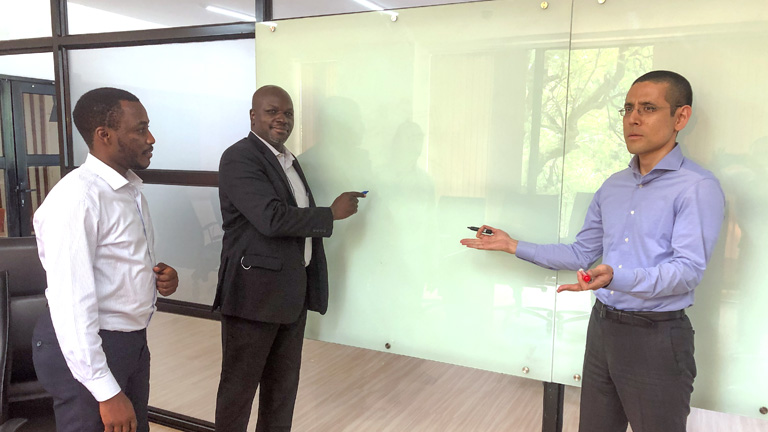
Miyamoto: How did you hear about the Mitsui & Co. Co-creation Fund?
Shimada: When I spoke about my idea with an acquaintance working for Mitsui & Co., Middle East Ltd., I was asked if I knew about the Mitsui & Co. Co-creation Fund. After learning that the Fund provided not only money, but also advice for accelerating business development, as well as networking support, I had no reason not to give it a try. Mitsui’s credibility and extensive project experience in Africa were also attractive.
Miyamoto: Access to advice and networking support as well as funding would be very reassuring for an entrepreneur.
Miyamoto: What was your impression after actually using the Mitsui & Co. Co-creation Fund?
Shimada: Actually, Connect Afya was in the process of raising capital at the time, and to be honest, I initially thought that it would be enough just to obtain funding. However, I soon realized that the Fund could offer even greater value. In addition to money, we have also benefited from specific advice about business development in Kenya, as well as support for the establishment of vital networks. Particularly important was Mitsui & Co.’s ability to act as an intermediary when we began to work with local partners.
As the name suggests, the Mitsui & Co. Co-creation Fund emphasizes co-creation, with Mitsui & Co. officers and employees as co-creators. My impression was that they are not interested simply in providing money. Instead, they are strongly committed to creating value together.
Miyamoto: It is reassuring that the word “co-creation” is not simply a slogan, but that the Fund’s activities embody the word “co-creation” in the form of practical support. I would like to hear about Mitsui & Co.’s role in local collaboration in a little more detail.
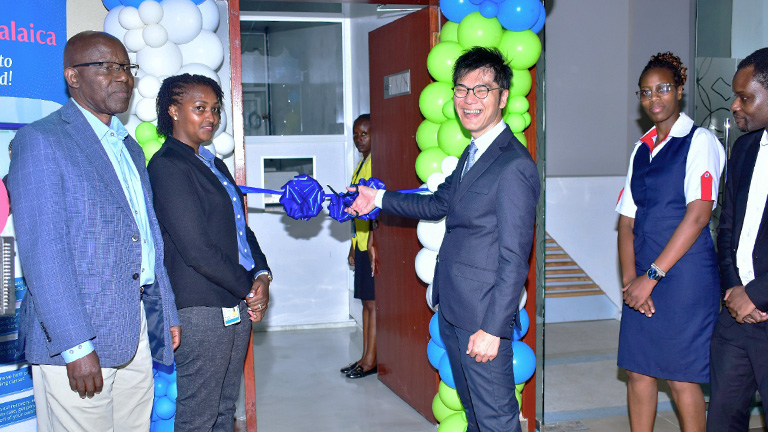
Miyamoto: So, what are your expectations toward your co-creators, and what value is being created through collaboration?
Shimada: What I expect from the co-creators is for them to possess detailed local knowledge and a passionate determination to solve the problems. By working with partners who have specialized knowledge about technology and logistics in particular, we can achieve things that would not have been possible before.
For example, we began to see tangible achievements by introducing data analysis technology for use in improving logistical efficiency and implementing countermeasures against infectious diseases. We couldn’t have achieved any of these things alone without this kind of collaboration. We look forward to creating more value in the future by leveraging our respective strengths.
Miyamoto: I can tell that you have been able to create new value by bringing together the capabilities of all the participants. The improvement of logistical efficiency and the introduction of data analysis technology must have had a major impact on the local operation.
Miyamoto: What do you think is necessary for solving this specific issue, beyond the support of the Mitsui & Co. Co-creation Fund?
Shimada: The most important thing is to build trust with local people. Without that trust, the systems that we introduce will not take root, no matter how great they are. I believe what underpins the trust is, after all, the track record of our steady and diligent work, and I’m mindful of that all the time.
We also need policy support. For example, by deepening coordination with governments and international organizations, we can broaden the scope of our impact. These approaches are essential for solving social issues.
Miyamoto: I agree that relationships based on trust are very important, as is human resource development. They, indeed, will lead to genuine solutions that truly reflect the nature of local issues. Relationships with the local government and international organizations are also vital when trying to obtain policy support.
Miyamoto: What are your expectations toward the future role of the Mitsui & Co. Co-creation Fund as well as its ecosystem?
Shimada: I hope that more players will participate in this ecosystem. Countless issues remain to be solved in regions like Africa, which is the focus of our activities. I hope many new projects will be launched to address these issues. I would also like examples of projects that have succeeded thanks to the Mitsui & Co. Co-creation Fund to be shared and used as role models for next-generation businesses and entrepreneurs. It would be delightful if we could create a cycle in which those role models lead to new initiatives that produce even greater value.
Miyamoto: The value of the Fund will certainly be further expanded if we can create an ecosystem that allows these successful models to be passed on to future generations. I hope that the Mitsui & Co. Co-creation Fund will continue to evolve as a forum where people take on new challenges one after another.
Miyamoto: Mr. Shimada, thank you for your valuable insights today.
Activity Highlights
1. Launch of Innovation Hub
The biggest research facility in East Africa was successfully opened and has been in operation since July 2024, with equipment that includes advanced gene sequencers. The first research project using this facility has already been implemented. Research using the innovation hub as infrastructure is underway (December 2024).
2. Partnership among Researchers Working in Research Organizations and Academia
Researchers from over 10 research organizations and academic institutions in Kenya are engaging as partners in training programs and research seminars at the innovation hub and are starting to discuss specific research projects to be carried out using the facility (as of December 2024).
3. Research Activities: The target is for 10 research projects and papers to be published by 2026. So far, one project has been implemented, and another seven are scheduled for 2025.
In addition to research carried out by researchers within Kenya, discussions are in progress with two Japanese universities concerning the provision of research support.
4. External Publication of Findings: Two Publications, Versus a Target of Four
The initial target called for four external publications by 2026. CA Medlynks’ initiative was presented at a Japanese FT/Nikkei infectious disease conference and an African investment forum in an effort to create structures that attract interested players in Japan and overseas.
Mitsui’s Materiality
“Build brighter futures, everywhere” as our corporate mission, and to gain the trust and expectations of our stakeholders to realize a better tomorrow for earth and for people around the world, we have identified six material issues (“Materiality”) for Mitsui’s sustainable growth. We anticipate this particular project/ business to contribute especially to the realization of “Foster a well-being society” and “Empower our people to build brighter futures”
-
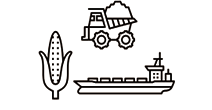
Establish a foundation for sustainable and stable supply
-
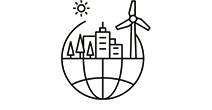
Create a community coexisting with nature
-
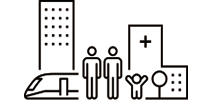
Foster a well-being society
-
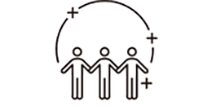
Cultivate societies that respect human rights
-
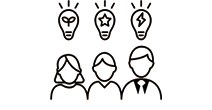
Empower our people to build brighter futures
-

Build an organization with integrity